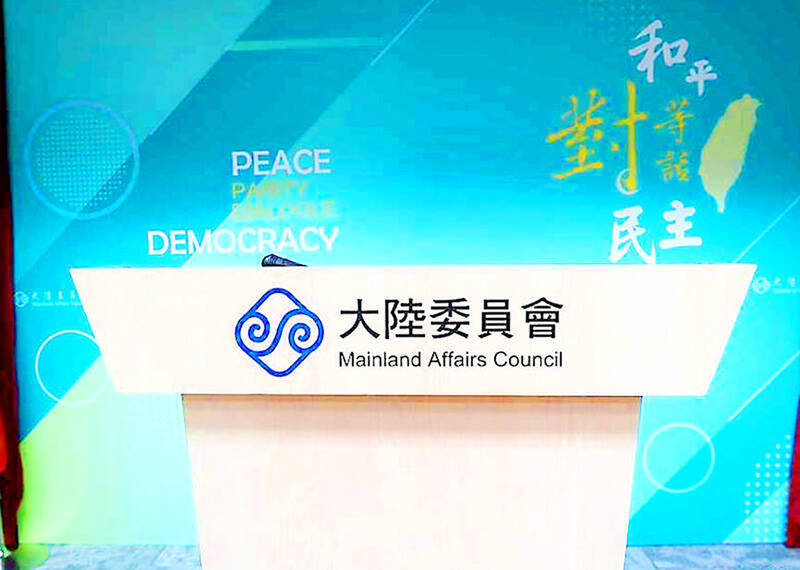China has no jurisdiction over Taiwan, and its so-called laws and norms have no binding force on Taiwanese, the Mainland Affairs Council (MAC) said yesterday as it called on Taiwanese “not to be threatened and intimidated” by the Chinese Communist Party (CCP).
The council issued the remarks after China earlier in the day threatened to impose the death penalty in extreme cases of what it called “diehard Taiwanese independence separatists.”
China’s state-run Xinhua news agency yesterday said the Chinese government unveiled guidelines that say its courts, prosecutors, public and state security bodies should “severely punish Taiwanese independence diehards for splitting the country and inciting secession in accordance with the law, and resolutely defend national sovereignty, unity and territorial integrity.”

Photo: Chung Li-hua, Taipei Times
The guidelines are in accordance with the law, including the 2005 “Anti-Secession” Law, Xinhua said.
Chinese Ministry of Public Security official Sun Ping (孫萍) yesterday told a news briefing in Beijing that the maximum penalty for the “crime of secession” was the death penalty.
“The sharp sword of legal action will always hang high,” she said.
The guidelines detail what is considered a crime worthy of punishment, including promoting Taiwan’s entry to international organizations where statehood is a condition, having “external official exchanges,” and “suppressing” groups or people promoting “reunification.”
The guidelines define “other acts that seek to separate Taiwan from China” a crime — a vague definition that could be interpreted in different ways.
The rules took effect in China yesterday, Xinhua said.
The MAC said that Beijing’s announcement is regretful, adding that it only highlighted the absolute and fundamental differences in the systems of government between Taiwan and China.
Under the Republic of China’s Constitution, Taiwan’s 23 million people enjoy rights to freedom and democracy, and such rights cannot be taken away from them, the MAC said.
The CCP’s regulations have no authority over Taiwanese, it added.
China’s actions serve only to sow discord among people on either side of the Taiwan Strait and severely harm civil exchanges, it said.
Such acts are also an “uncivilized and brutish challenge” against free and democratic countries that love Taiwan and support its democracy, the MAC said.
Taiwan Thinktank researcher Wu Se-chih (吳瑟致) said that Beijing’s clear stance on using the law as punishment is an attempt to place more pressure on Taiwanese and increase the efficacy of its legal warfare tactics.
National Cheng Kung University political science academic Hung Chin-fu (洪敬富) said legal warfare has been an oft-seen method of oppression since the 20th National Congress of the CCP in October last year.
The guidelines issued by the CCP yesterday do not mention the scope of the law’s enforcement, giving rise to selective enforcement on isolated individuals to make an example and deter people through fear, Hung said.
Hung and Wu urged Taiwanese to exercise caution when contemplating a visit to China, and ensure that their past actions and speech do not contravene its laws.
Additional reporting by Wu Che-yu

TRUST: The KMT said it respected the US’ timing and considerations, and hoped it would continue to honor its commitments to helping Taiwan bolster its defenses and deterrence US President Donald Trump is delaying a multibillion-dollar arms sale to Taiwan to ensure his visit to Beijing is successful, a New York Times report said. The weapons sales package has stalled in the US Department of State, the report said, citing US officials it did not identify. The White House has told agencies not to push forward ahead of Trump’s meeting with Chinese President Xi Jinping (習近平), it said. The two last month held a phone call to discuss trade and geopolitical flashpoints ahead of the summit. Xi raised the Taiwan issue and urged the US to handle arms sales to

A magnitude 5.6 earthquake struck off the coast of Yilan County at 12:37pm today, with clear shaking felt across much of northern Taiwan. There were no immediate reports of damage. The epicenter of the quake was 16.9km east-southeast of Yilan County Hall offshore at a depth of 66.8km, Central Weather Administration (CWA) data showed. The maximum intensity registered at a 4 in Yilan County’s Nanao Township (南澳) on Taiwan’s seven-tier scale. Other parts of Yilan, as well as certain areas of Hualien County, Taipei, New Taipei City, Taoyuan, Hsinchu County, Taichung and Miaoli County, recorded intensities of 3. Residents of Yilan County and Taipei received

Taiwan has secured another breakthrough in fruit exports, with jujubes, dragon fruit and lychees approved for shipment to the EU, the Ministry of Agriculture said yesterday. The Animal and Plant Health Inspection Agency on Thursday received formal notification of the approval from the EU, the ministry said, adding that the decision was expected to expand Taiwanese fruit producers’ access to high-end European markets. Taiwan exported 126 tonnes of lychees last year, valued at US$1.48 million, with Japan accounting for 102 tonnes. Other export destinations included New Zealand, Hong Kong, the US and Australia, ministry data showed. Jujube exports totaled 103 tonnes, valued at

BIG SPENDERS: Foreign investors bought the most Taiwan equities since 2005, signaling confidence that an AI boom would continue to benefit chipmakers Taiwan Semiconductor Manufacturing Co’s (TSMC, 台積電) market capitalization swelled to US$2 trillion for the first time following a 4.25 percent rally in its American depositary receipts (ADR) overnight, putting the world’s biggest contract chipmaker sixth on the list of the world’s biggest companies by market capitalization, just behind Amazon.com Inc. The site CompaniesMarketcap.com ranked TSMC ahead of Saudi Aramco and Meta Platforms Inc. The Taiwanese company’s ADRs on Tuesday surged to US$385.75 on the New York Stock Exchange, as strong demand for artificial intelligence (AI) applications led to chip supply constraints and boost revenue growth to record-breaking levels. Each TSMC ADR represents